Cite this document
(Global Economy Essay Example | Topics and Well Written Essays - 2000 words - 1, n.d.)
Global Economy Essay Example | Topics and Well Written Essays - 2000 words - 1. https://studentshare.org/macro-microeconomics/1878552-global-economy
Global Economy Essay Example | Topics and Well Written Essays - 2000 words - 1. https://studentshare.org/macro-microeconomics/1878552-global-economy
(Global Economy Essay Example | Topics and Well Written Essays - 2000 Words - 1)
Global Economy Essay Example | Topics and Well Written Essays - 2000 Words - 1. https://studentshare.org/macro-microeconomics/1878552-global-economy.
Global Economy Essay Example | Topics and Well Written Essays - 2000 Words - 1. https://studentshare.org/macro-microeconomics/1878552-global-economy.
“Global Economy Essay Example | Topics and Well Written Essays - 2000 Words - 1”. https://studentshare.org/macro-microeconomics/1878552-global-economy.


